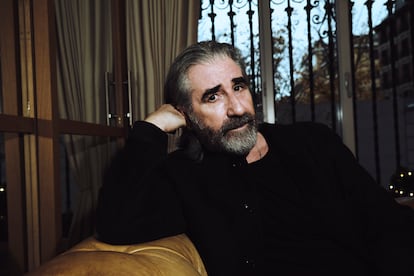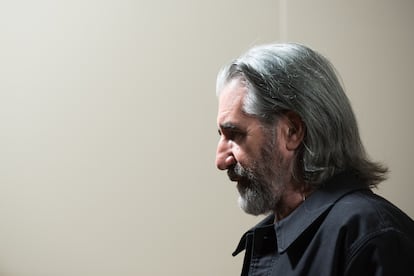Actor John Lynch: ‘Some people stop drinking when they realize alcohol is bad for them – I did the opposite’
Long identified with roles playing Irish nationalists, the actor is now promoting the second season of the HBO series ‘The Head’

Even though he was born in England, John Lynch is a Catholic son of Northern Ireland, so he’s pleased that France knocked England out of the 2022 FIFA World Cup in Qatar. Lynch was in Madrid to promote the second season of The Head, an HBO thriller created by two brothers from Barcelona – Alex and David Pastor. Argentina has just made it into the World Cup finals, and Lynch is worried about whether he will be able to watch the second semifinal that night in his hotel. He wants to get together with some friends to watch the match, but there will be no drinking – Lynch has been sober for 20 years. He quit shortly after starring in a biopic about George Best, one of Britain’s greatest soccer players who also had a serious drinking problem.
Lynch used to be a regular at the pubs in Northern Ireland, but never in Protestant neighborhoods where he was not welcome. For many years, Lynch had immersed himself in roles playing sympathizers and members of the Irish Republican Army (IRA). Roles like Paul Hill (one of the Guildford Four) in In the Name of the Father (1993), and Bobby Sands (who died in 1981 on hunger strike in the Maze prison) in Some Mother’s Son (1996). He was the unofficial face of Irish nationalism and proud of it. “It was my contribution to the cause,” he explains. “Those films spoke of the reality I lived. I was nine years old, and I remember the British Army arriving. I remember the fear.”
Lynch’s childhood experiences set the course for his acting career. His father and mother met in England – she was from Italy, and he was from Northern Ireland. They fell in love, had children and in 1969, they packed up their things and moved to hell, which in those days was known as Northern Ireland. They chose one of the worst places to live in that particular hell – South Armagh, on the border between the north and the south of Ireland. Due to the heavy presence of Provisional IRA troops, it was the most militarized region in Western Europe at the time, halfway between Dublin and Belfast. The Protestants wanted to remain part of the United Kingdom and the Catholics were fighting for Irish independence.
Much like the young boy in Kenneth Branagh’s deeply personal film, Belfast, Lynch grew up in a Catholic family in a neighborhood clogged by barricades that frequently smelled like gasoline from Molotov cocktails. Lynch says his own grandfather belonged to the IRA. “There was a strong political atmosphere – it was everywhere.” He learned early on to be on constant alert, to be suspicious of everyone. “When I was 10 or 11 years old, I would avoid the road. I would go through the fields and go a long, long, long way around to avoid the army… where I grew up, the British Army was not welcome. They were not our people.”

Growing up in this environment, it’s not surprising that Lynch’s began acting in Irish language plays at school. His first big break came when he was only 22 and still studying at a London drama school. Lynch played the starring role in Cal (1984), the story of a young IRA soldier who falls in love with Marcella (Helen Mirren), the Catholic widow of a Protestant policeman killed by the IRA.
The role of Cal fit Lynch perfectly, so much so that he would play several variations of the role in the years that followed, aided by his tormented face and years spent in the dark, militarized landscape of Northern Ireland. He says he had many doubts about accepting the role of Bobby Sands, one of the great icons of Irish nationalism who died in prison after a 66-day hunger strike. “It wasn’t long after he died from the hunger strike, and I thought that a lot of people would be offended if we got it wrong,” said Lynch.
Great directors like Jim Sheridan, Neil Jordan and Ken Loach have all tackled the conflict in Northern Ireland and made some remarkable films. Lynch has worked with some of these directors, as well as with three-time Oscar winner, Daniel Day-Lewis. “Working with him, you realize why he is one of the greatest actors in the history of film.” He remembers when director Jim Sheridan called a meeting in a bar before shooting began on In the Name of the Father. “I had met Daniel a few times before, and we were friends, but not close friends,” said Lynch. “In the bar, he was speaking in his normal [London] accent. Two days later, we turn up on the set to start shooting, and Daniel is talking in a Belfast accent. He keeps the Belfast accent going all the time… even when we went out for dinner in the evening… I’ve never seen such commitment in all my acting career.”
But Lynch’s reputation among film producers began to suffer from his heavy drinking, a problem that began when he was very young. “Some people stop drinking when they realize that alcohol is bad for them. I was basically doing the opposite. There were problems on sets – I insulted producers and behaved badly. A man takes a drink… the drink takes the man,” said Lynch, quoting an old Irish saying.
No one wanted to work with Lynch after he finished the self-financed George Best biopic. “I was in a corner and didn’t know what to do.” He faced his disease and managed to stop drinking. With no prospects for acting work, Lynch remembered how much he loved literature and sat down to write. “I used writing as a way of being honest with myself… I started writing and the first four months were just useless, terrible. But I kept trying… and then I started thinking, maybe I have a story. And I kept going. A year later I sent it to an agent in Dublin and it got published.” Torn Water was published in 2005 and got positive reviews. “If I had to choose the most significant moment of my career, I would choose the day the first copy of the book arrived at my house,” said Lynch.
Lynch is now working on his fourth novel. He currently lives in Nice in the south of France with his wife, Christine. He has never forgotten the dark years of life in Northern Ireland, and is glad to have left all the violence behind. “Ninety-eight percent of the people there believe that the only way forward is through dialogue,” he said.
In The Head, the Spanish-made, English-language psychological thriller television series on HBO, Lynch plays Arthur Wilde, one of the few surviving characters from the first season. The setting for the second season is a ship on the high seas instead of a research center in Antarctica, but the pervasive feeling of claustrophobia remains.
Lynch now has a solid body of work under his belt, mostly playing essential supporting roles. In The Fall, a crime drama television series filmed and set in Northern Ireland and starring Gillian Anderson, Lynch played Jim Burns, a tormented police chief hunting for a serial killer on the streets of Belfast. “The writer of that series made good use of the shadows I grew up in. In the series, Northern Ireland is just starting to get over what happened, and this serial killer emerges from that shadow of death. It’s totally believable that the city could spawn someone like him.”
Sign up for our weekly newsletter to get more English-language news coverage from EL PAÍS USA Edition
Tu suscripción se está usando en otro dispositivo
¿Quieres añadir otro usuario a tu suscripción?
Si continúas leyendo en este dispositivo, no se podrá leer en el otro.
FlechaTu suscripción se está usando en otro dispositivo y solo puedes acceder a EL PAÍS desde un dispositivo a la vez.
Si quieres compartir tu cuenta, cambia tu suscripción a la modalidad Premium, así podrás añadir otro usuario. Cada uno accederá con su propia cuenta de email, lo que os permitirá personalizar vuestra experiencia en EL PAÍS.
¿Tienes una suscripción de empresa? Accede aquí para contratar más cuentas.
En el caso de no saber quién está usando tu cuenta, te recomendamos cambiar tu contraseña aquí.
Si decides continuar compartiendo tu cuenta, este mensaje se mostrará en tu dispositivo y en el de la otra persona que está usando tu cuenta de forma indefinida, afectando a tu experiencia de lectura. Puedes consultar aquí los términos y condiciones de la suscripción digital.









































